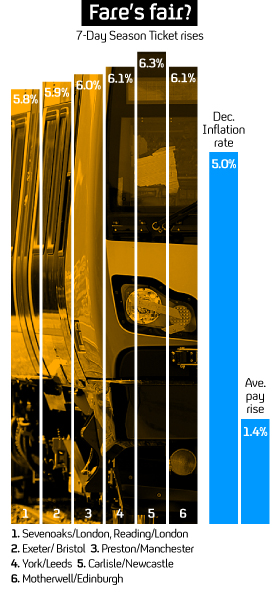Train fares to rise by an average 5.9 per cent
UK train fares will rise by an average of 0.7 per cent above the rate of inflation from January 2012, the Asssociation of Train Operating Companies has announced.

The new fares will come into effect on 2 January 2012 and can be found at National Rail Enquiries.
Figures supplied by The Association of Train Operating Companies (ATOC) show that the average price paid for a single ticket is £5.00. Applying January’s 5.9 per cent rise would see this figure rise to £5.30.
The level of fare rises is determined largely by government, which has been set at retail price index (RPI) plus 1 per cent since 2004.
Around half of all fares are set using this formula, which is based on July’s inflation. These “regulated fares” comprise season tickets for most commuter journeys and off-peak fares on most intercity journeys.
Since 2004 the government has sought to reduce the contribution to rail investment from taxpayers and increase the share paid by passengers.
The announcement of the average fare increase is a few weeks later than usual following the government’s decision in November to lower the average rise it had set for season tickets and some other fares in 2012.
Devolved administrations in Scotland and Wales had already decided to keep regulated fares at RPI plus 1 per cent for Scotrail and many Arriva Trains Wales services, so most of Britain will now see the same average rise for regulated fares in 2012.
Train companies also have some flexibility to vary their regulated fare increase for regulated journeys by up to 5 per cent above the average change in regulated fares, but these increases must be offset by smaller increases, freezes or cuts for other journeys.
The changes mean that the average price paid for a Off-Peak Return will rise to –
– London to Norwich on NXEA rising by 0.7 per cent from £45.70 to £46.00
– London to Newcastle on East Coast rising by 4.9 per cent from £197.80 to £207.50
– Bristol to Edinburgh on CrossCountry rising by 5.3 per cent from £143.5 to £151.10
– Farnborough to London on South West Trains rising by 5.9 per cent from £15.30 to £16.20
– Preston to Manchester on First Transpennine rising by 6.3 per cent from £14.40 to £15.30
– London to Kettering on East Midlands Trains rising by 8.6 per cent from ££58.00 to £63.00

‘Spotlight on train operators and Network Rail’
Train companies set the remaining fares, known as unregulated tickets. These cover cheap advance fares, leisure tickets for local journeys, and business fares for intercity journeys at busier times of the day.
Michael Roberts, chief executive of ATOC, said: “Money raised through fares helps pay for new trains, faster services and better stations.
“The long-standing government approach to sustaining rail investment is to cut the contribution from taxpayers and increase the share paid for by passengers.
“The industry is working together to continue cutting costs as a way to help limit future fare rises and offer better value for money for taxpayers over the longer term.”
Anthony Smith, chief executive of passenger lobby group Passenger Focus, said: “Passengers will be relieved that the government has capped the fares formula at RPI plus 1. However, this has still led to average 6 per cent rises, which will not be reflected in most people’s pay.
“The spotlight will really be on train operating companies and Network Rail to deliver on their promises about performance and overcrowding. We passengers are paying our fair share – and we want and deserve better.”
Public funding for the railways has dropped by a third since 2006/7, while the money raised through fares has steadily increased. Currently, passengers contribute around £6.5bn and taxpayers £4bn a year to the running of the railways.
Figures provided by ATOC show that demand for rail travel is running at a level not seen since the 1920s, with more than 1.3bn journeys a year.
Money raised from fares will help to fund what ATOC described as one of the biggest packages of rail investment for a century.
It will include more than 2,700 new rail carriages, the Crossrail and Thameslink projects in London, and electrification of parts of the network.